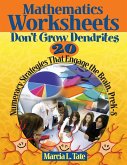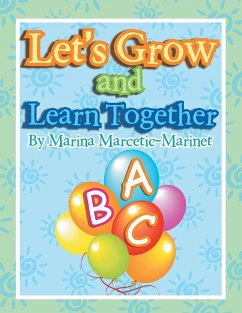- Broschiertes Buch
- Merkliste
- Auf die Merkliste
- Bewerten Bewerten
- Teilen
- Produkt teilen
- Produkterinnerung
- Produkterinnerung
Dispel discipline problems with new classroom management techniques! Behavioral problems often occur when students are bored or unmotivated. This newly revised edition from education expert, Marcia L. Tate, helps you detour students around misbehavior. Tate provides updated research, new vignettes, the latest classroom management, and Common Core-aligned techniques that will help: • Establish a relationship with students that supports deep learning • Deliver brain-compatible lessons • Work with students who have attention deficit disorder and chronic behavior problems • Promote student…mehr
Andere Kunden interessierten sich auch für
![Mathematics Worksheets Don't Grow Dendrites Mathematics Worksheets Don't Grow Dendrites]() Marcia L. TateMathematics Worksheets Don't Grow Dendrites43,99 €
Marcia L. TateMathematics Worksheets Don't Grow Dendrites43,99 €![Social Studies Worksheets Don't Grow Dendrites Social Studies Worksheets Don't Grow Dendrites]() Marcia L. TateSocial Studies Worksheets Don't Grow Dendrites43,99 €
Marcia L. TateSocial Studies Worksheets Don't Grow Dendrites43,99 €![Worksheets Don't Grow Dendrites Worksheets Don't Grow Dendrites]() Marcia L. TateWorksheets Don't Grow Dendrites41,99 €
Marcia L. TateWorksheets Don't Grow Dendrites41,99 €![Reading and Language Arts Worksheets Don't Grow Dendrites Reading and Language Arts Worksheets Don't Grow Dendrites]() Marcia L. TateReading and Language Arts Worksheets Don't Grow Dendrites41,99 €
Marcia L. TateReading and Language Arts Worksheets Don't Grow Dendrites41,99 €![Sowing Seeds in Barren Soil: Why Space Power Theory Just Won't Grow Sowing Seeds in Barren Soil: Why Space Power Theory Just Won't Grow]() Elvert L. GardnerSowing Seeds in Barren Soil: Why Space Power Theory Just Won't Grow64,99 €
Elvert L. GardnerSowing Seeds in Barren Soil: Why Space Power Theory Just Won't Grow64,99 €![Never to grow up Never to grow up]() Robert D. SollarsNever to grow up16,99 €
Robert D. SollarsNever to grow up16,99 €![Let's Grow and Learn Together Let's Grow and Learn Together]() Marina Marcetic-MarinetLet's Grow and Learn Together26,99 €
Marina Marcetic-MarinetLet's Grow and Learn Together26,99 €-
-
-
Dispel discipline problems with new classroom management techniques! Behavioral problems often occur when students are bored or unmotivated. This newly revised edition from education expert, Marcia L. Tate, helps you detour students around misbehavior. Tate provides updated research, new vignettes, the latest classroom management, and Common Core-aligned techniques that will help: • Establish a relationship with students that supports deep learning • Deliver brain-compatible lessons • Work with students who have attention deficit disorder and chronic behavior problems • Promote student concentration and memory with classroom arrangement, light, color, and music Implement the crucial elements for lasting motivation and engagement with this essential guide!
Hinweis: Dieser Artikel kann nur an eine deutsche Lieferadresse ausgeliefert werden.
Hinweis: Dieser Artikel kann nur an eine deutsche Lieferadresse ausgeliefert werden.
Produktdetails
- Produktdetails
- Verlag: Corwin
- 2. Auflage
- Seitenzahl: 176
- Erscheinungstermin: 26. Juni 2014
- Englisch
- Abmessung: 280mm x 216mm x 10mm
- Gewicht: 460g
- ISBN-13: 9781483350974
- ISBN-10: 1483350975
- Artikelnr.: 40033745
- Herstellerkennzeichnung
- Produktsicherheitsverantwortliche/r
- Europaallee 1
- 36244 Bad Hersfeld
- gpsr@libri.de
- Verlag: Corwin
- 2. Auflage
- Seitenzahl: 176
- Erscheinungstermin: 26. Juni 2014
- Englisch
- Abmessung: 280mm x 216mm x 10mm
- Gewicht: 460g
- ISBN-13: 9781483350974
- ISBN-10: 1483350975
- Artikelnr.: 40033745
- Herstellerkennzeichnung
- Produktsicherheitsverantwortliche/r
- Europaallee 1
- 36244 Bad Hersfeld
- gpsr@libri.de
Marcia L. Tate, EdD, is the former executive director of professional development for the DeKalb County School System in Decatur, Georgia. During her thirty-year career with the district, she has been a classroom teacher, reading specialist, language arts coordinator, and staff development executive director. Marcia is currently an educational consultant and has taught over 500,000 administrators, teachers, parents, and business and community leaders throughout the world. She is the author of the eight books in the best-selling Worksheets Don't Grow Dendrites series and four additional books: Formative Assessment in a Brain-Compatible Classroom: How Do We Really Know They're Learning?, 100 Brain-Friendly Lessons for Unforgettable Teaching and Learning K-8, and 100 Brain-Friendly Lessons for Unforgettable Teaching and Learning 9-12, and her latest book, Healthy Teachers, Happy Classrooms that is designed to address both the personal and professional lives of all educators. Participants in her workshops refer to them as some of the best ones they have ever experienced since Marcia uses the twenty strategies outlined in her books to actively engage her audiences. Marcia received her bachelor's degree in psychology and elementary education from Spelman College in Atlanta, Georgia. She earned her master's degree in remedial reading from the University of Michigan in Ann Arbor, her specialist degree in educational leadership from Georgia State University, and her doctorate in educational leadership from Clark Atlanta University. Marcia is married to Tyrone Tate and is the proud mother of three children: Jennifer, Jessica, and Christopher, and nine grandchildren: Christian, Aidan, Maxwell, Aaron, Roman, Shiloh, Aya, Noah, and Alyssa. Marcia and her husband own the company Developing Minds, Inc. and can be contacted by calling the company at (770) 918-5039, emailing her at marciata@ bellsouth.net, or by visiting her website at www.developingmindsinc.com. You can also follow her on Twitter and Instagram at @DrMarciaTate.
Acknowledgments
About the Author
Introduction
Detour: Get to Know Each Student
1. Develop a Relationship With Each Student
What: Creating a Caring Culture
Why: Theoretical Framework
How: Classroom Application
Reflection
2. Expect the Best!
What: You Get What You Expect
Why: Theoretical Framework
How: Classroom Application
Reflection
3. Understand the Symptoms
What: Causes of Misbehavior
Why: Theoretical Framework
How: Classroom Application
Reflection
Detour: Create a Physical Environment Conducive to Learning
4. Light Up Their World
What: Lighting and the Brain
Why: Theoretical Framework
How: Classroom Application
Reflection
5. Let the Music Play
What: Music and the Brain
Why: Theoretical Framework
How: Classroom Application
Reflection
6. Color Their World
What: Color and the Brain
Why: Theoretical Framework
How: Classroom Application
Reflection
7. Stop and Smell the Roses
What: Aromas and the Brain
Why: Theoretical Framework
How: Classroom Application
Reflection
8. Create a Natural Environment
What: Room Arrangement and the Brain
Why: Theoretical Framework
How: Classroom Application
Reflection
Detour: Engage the Brains of Your Students
9. Use Brain-Compatible Strategies
What: Engaging the Brain
Why: Theoretical Framework
How: Classroom Application
Reflection
10. Hook Them Into Relevant Lessons
What: Attention and the Bain
Why: Theoretical Framework
How: Classroom Application
Reflection
11. Let Them Talk!
What: Conversation and the Brain
Why: Theoretical Framework
How: Classroom Application
Reflection
12. Let Them Move!
What: Movement and the Brain
Why: Theoretical Framework
How: Classroom Application
Reflection
13. Keep Them Laughing
What: Humor and the Brain
Why: Theoretical Framework
How: Classroom Application
Reflection
Detour: Develop a Proactive Management Plan
14. Teach Your Rituals
What: Establishing Your Procedures
Why: Theoretical Framework
How: Classroom Application
Reflection
15. Accentuate the Positive
What: Creating an Affirming Classroom Environment
Why: Theoretical Framework
How: Classroom Application
Reflection
16. Celebrate Good Times, Come On!
What: Celebrations and the Brain
Why: Theoretical Framework
How: Classroom Application
Reflection
17. Use Low-Profile Interventions
What: Intervening Appropriately
Why: Theoretical Framework
How: Classroom Application
Reflection
18. De-emphasize the Negative
What: Consequences For Misbehavior
Why: Theoretical Framework
How: Classroom Application
Reflection
19. Get Help With Chronic Behavior Challenges
What: Managing the Difficult to Manage
Why: Theoretical Framework
How: Classroom Application
Reflection
20. Solicit Parental Support
What: Parents on Your Side
Why: Theoretical Framework
How: Classroom Application
Reflection
Bibliography
Index
About the Author
Introduction
Detour: Get to Know Each Student
1. Develop a Relationship With Each Student
What: Creating a Caring Culture
Why: Theoretical Framework
How: Classroom Application
Reflection
2. Expect the Best!
What: You Get What You Expect
Why: Theoretical Framework
How: Classroom Application
Reflection
3. Understand the Symptoms
What: Causes of Misbehavior
Why: Theoretical Framework
How: Classroom Application
Reflection
Detour: Create a Physical Environment Conducive to Learning
4. Light Up Their World
What: Lighting and the Brain
Why: Theoretical Framework
How: Classroom Application
Reflection
5. Let the Music Play
What: Music and the Brain
Why: Theoretical Framework
How: Classroom Application
Reflection
6. Color Their World
What: Color and the Brain
Why: Theoretical Framework
How: Classroom Application
Reflection
7. Stop and Smell the Roses
What: Aromas and the Brain
Why: Theoretical Framework
How: Classroom Application
Reflection
8. Create a Natural Environment
What: Room Arrangement and the Brain
Why: Theoretical Framework
How: Classroom Application
Reflection
Detour: Engage the Brains of Your Students
9. Use Brain-Compatible Strategies
What: Engaging the Brain
Why: Theoretical Framework
How: Classroom Application
Reflection
10. Hook Them Into Relevant Lessons
What: Attention and the Bain
Why: Theoretical Framework
How: Classroom Application
Reflection
11. Let Them Talk!
What: Conversation and the Brain
Why: Theoretical Framework
How: Classroom Application
Reflection
12. Let Them Move!
What: Movement and the Brain
Why: Theoretical Framework
How: Classroom Application
Reflection
13. Keep Them Laughing
What: Humor and the Brain
Why: Theoretical Framework
How: Classroom Application
Reflection
Detour: Develop a Proactive Management Plan
14. Teach Your Rituals
What: Establishing Your Procedures
Why: Theoretical Framework
How: Classroom Application
Reflection
15. Accentuate the Positive
What: Creating an Affirming Classroom Environment
Why: Theoretical Framework
How: Classroom Application
Reflection
16. Celebrate Good Times, Come On!
What: Celebrations and the Brain
Why: Theoretical Framework
How: Classroom Application
Reflection
17. Use Low-Profile Interventions
What: Intervening Appropriately
Why: Theoretical Framework
How: Classroom Application
Reflection
18. De-emphasize the Negative
What: Consequences For Misbehavior
Why: Theoretical Framework
How: Classroom Application
Reflection
19. Get Help With Chronic Behavior Challenges
What: Managing the Difficult to Manage
Why: Theoretical Framework
How: Classroom Application
Reflection
20. Solicit Parental Support
What: Parents on Your Side
Why: Theoretical Framework
How: Classroom Application
Reflection
Bibliography
Index
Acknowledgments
About the Author
Introduction
Detour: Get to Know Each Student
1. Develop a Relationship With Each Student
What: Creating a Caring Culture
Why: Theoretical Framework
How: Classroom Application
Reflection
2. Expect the Best!
What: You Get What You Expect
Why: Theoretical Framework
How: Classroom Application
Reflection
3. Understand the Symptoms
What: Causes of Misbehavior
Why: Theoretical Framework
How: Classroom Application
Reflection
Detour: Create a Physical Environment Conducive to Learning
4. Light Up Their World
What: Lighting and the Brain
Why: Theoretical Framework
How: Classroom Application
Reflection
5. Let the Music Play
What: Music and the Brain
Why: Theoretical Framework
How: Classroom Application
Reflection
6. Color Their World
What: Color and the Brain
Why: Theoretical Framework
How: Classroom Application
Reflection
7. Stop and Smell the Roses
What: Aromas and the Brain
Why: Theoretical Framework
How: Classroom Application
Reflection
8. Create a Natural Environment
What: Room Arrangement and the Brain
Why: Theoretical Framework
How: Classroom Application
Reflection
Detour: Engage the Brains of Your Students
9. Use Brain-Compatible Strategies
What: Engaging the Brain
Why: Theoretical Framework
How: Classroom Application
Reflection
10. Hook Them Into Relevant Lessons
What: Attention and the Bain
Why: Theoretical Framework
How: Classroom Application
Reflection
11. Let Them Talk!
What: Conversation and the Brain
Why: Theoretical Framework
How: Classroom Application
Reflection
12. Let Them Move!
What: Movement and the Brain
Why: Theoretical Framework
How: Classroom Application
Reflection
13. Keep Them Laughing
What: Humor and the Brain
Why: Theoretical Framework
How: Classroom Application
Reflection
Detour: Develop a Proactive Management Plan
14. Teach Your Rituals
What: Establishing Your Procedures
Why: Theoretical Framework
How: Classroom Application
Reflection
15. Accentuate the Positive
What: Creating an Affirming Classroom Environment
Why: Theoretical Framework
How: Classroom Application
Reflection
16. Celebrate Good Times, Come On!
What: Celebrations and the Brain
Why: Theoretical Framework
How: Classroom Application
Reflection
17. Use Low-Profile Interventions
What: Intervening Appropriately
Why: Theoretical Framework
How: Classroom Application
Reflection
18. De-emphasize the Negative
What: Consequences For Misbehavior
Why: Theoretical Framework
How: Classroom Application
Reflection
19. Get Help With Chronic Behavior Challenges
What: Managing the Difficult to Manage
Why: Theoretical Framework
How: Classroom Application
Reflection
20. Solicit Parental Support
What: Parents on Your Side
Why: Theoretical Framework
How: Classroom Application
Reflection
Bibliography
Index
About the Author
Introduction
Detour: Get to Know Each Student
1. Develop a Relationship With Each Student
What: Creating a Caring Culture
Why: Theoretical Framework
How: Classroom Application
Reflection
2. Expect the Best!
What: You Get What You Expect
Why: Theoretical Framework
How: Classroom Application
Reflection
3. Understand the Symptoms
What: Causes of Misbehavior
Why: Theoretical Framework
How: Classroom Application
Reflection
Detour: Create a Physical Environment Conducive to Learning
4. Light Up Their World
What: Lighting and the Brain
Why: Theoretical Framework
How: Classroom Application
Reflection
5. Let the Music Play
What: Music and the Brain
Why: Theoretical Framework
How: Classroom Application
Reflection
6. Color Their World
What: Color and the Brain
Why: Theoretical Framework
How: Classroom Application
Reflection
7. Stop and Smell the Roses
What: Aromas and the Brain
Why: Theoretical Framework
How: Classroom Application
Reflection
8. Create a Natural Environment
What: Room Arrangement and the Brain
Why: Theoretical Framework
How: Classroom Application
Reflection
Detour: Engage the Brains of Your Students
9. Use Brain-Compatible Strategies
What: Engaging the Brain
Why: Theoretical Framework
How: Classroom Application
Reflection
10. Hook Them Into Relevant Lessons
What: Attention and the Bain
Why: Theoretical Framework
How: Classroom Application
Reflection
11. Let Them Talk!
What: Conversation and the Brain
Why: Theoretical Framework
How: Classroom Application
Reflection
12. Let Them Move!
What: Movement and the Brain
Why: Theoretical Framework
How: Classroom Application
Reflection
13. Keep Them Laughing
What: Humor and the Brain
Why: Theoretical Framework
How: Classroom Application
Reflection
Detour: Develop a Proactive Management Plan
14. Teach Your Rituals
What: Establishing Your Procedures
Why: Theoretical Framework
How: Classroom Application
Reflection
15. Accentuate the Positive
What: Creating an Affirming Classroom Environment
Why: Theoretical Framework
How: Classroom Application
Reflection
16. Celebrate Good Times, Come On!
What: Celebrations and the Brain
Why: Theoretical Framework
How: Classroom Application
Reflection
17. Use Low-Profile Interventions
What: Intervening Appropriately
Why: Theoretical Framework
How: Classroom Application
Reflection
18. De-emphasize the Negative
What: Consequences For Misbehavior
Why: Theoretical Framework
How: Classroom Application
Reflection
19. Get Help With Chronic Behavior Challenges
What: Managing the Difficult to Manage
Why: Theoretical Framework
How: Classroom Application
Reflection
20. Solicit Parental Support
What: Parents on Your Side
Why: Theoretical Framework
How: Classroom Application
Reflection
Bibliography
Index








